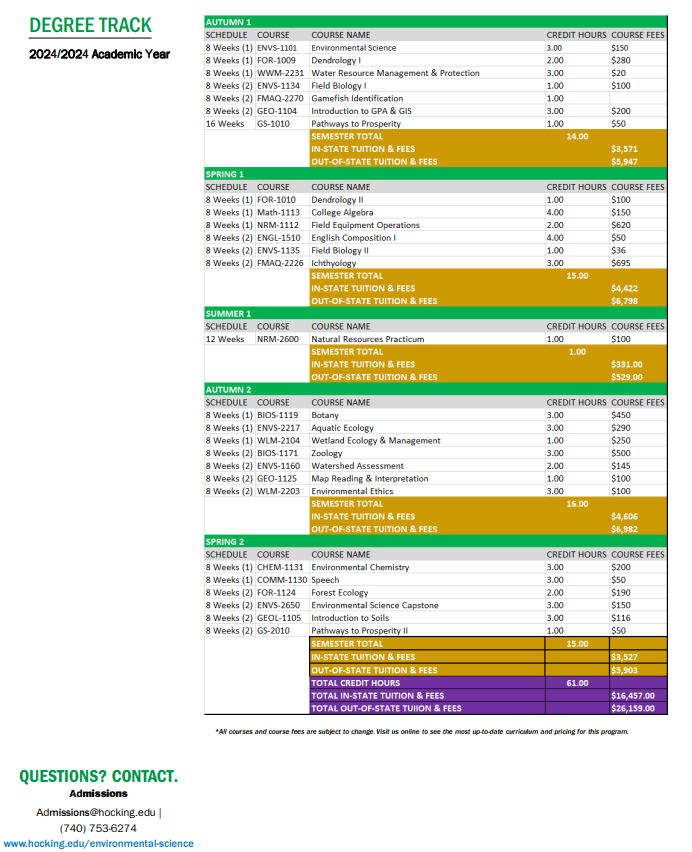Environmental Science Program description
The Environmental Science program provides the training needed to work in the environmental consulting field. This degree will cover all aspects of environmental science, including topics such as environmental biology, chemistry and geography as well as environmental ethics and natural resources skills.
A combination of field and lab experiences will prepare students for entry-level positions in environmental consulting, as well as local, state and federal agencies. This degree will also provide a good foundation for those students who want to continue on to another institution to pursue a bachelor’s degree.
Hocking College offers all-inclusive pricing and works with students to assure they have complete college funding, including financial aid, before they start classes. Please reference the course curriculum tab for program costs.
All-inclusive pricing includes the following:
PER SEMESTER
$300......Learning Fee
$20........Health Center Services
$75........Career Center Services
Not included in the All-Inclusive Pricing
$53......Parking
Pricing for housing and meal plans can be found here.
Hocking College serves to create employment opportunities to the population of our region through technical education in fields where jobs are in demand. This degree in Environmental Science will provide our graduates with the training needed to be knowledgeable in the fields of science and skilled in the techniques needed to work in the environmental consulting field.
Student Learning Outcomes (SLOs) are statements of what a student will be able to do when they have completed a program. They represent the knowledge and skills a program has determined are most important for students to gain from that program and include both the Success Skills (institutional outcomes) and Program Outcomes. SLOs are specific and measurable so the program can accurately assess the degree to which students have achieved each outcome, and they align with college and institution mission and values. Data on the achievement of SLOs is used to make improvements in the program and increase student success.
Hocking College Institutional Learning Outcomes
1) Demonstrate sound critical thinking, information literacy and technological competency in the production of academic writing and presentations
2) Apply the methods of mathematical, statistical or analytical reasoning to critically evaluate data, solve problems and effectively communicate findings.
3) Demonstrate an awareness of the social, political and economic forces which shape individuals, institutions and communities in the modern world.
4)Understand social justice and the diversities and complexities of the cultural and social world past and present and come to an informed sense of self and others.
5)Demonstrate a foundation of knowledge in the natural sciences based on theory and laboratory skills.
6) Cultivate ethical values, personal wellness and personal learning strategies in the development of the whole person, mind, body and spirit.
7) Integrate content material to application in the workforce and apply discipline specific knowledge and skills to successfully transfer or effectively meet the expectations of internships, workplace, volunteerism and/or entrepreneurship endeavors.
8) Utilize the ethical and professional application of current information technology and tools effectively.
Program Outcomes
The following outcomes are skills, behaviors, and attitudes cultivated in students seeking the Associate of Applied Science in Environmental Science:
- Utilize current skills and techniques in environmental science to work
effectively in a diversity of settings; - Apply ecological and scientific understanding of natural systems to
environmental issues or problems; - Know environmental laws, regulations, and policy and understand their
implications to managing natural areas; - Communicate professionally and effectively with diverse audiences
orally and in written form; - Work and behave ethically and appropriately as a professional;
- Identifies species of indicator organisms using keys and site information
- Uses knowledge of the impact of, and methods for controlling insects,
diseases and animals. - Correctly uses equipment and techniques to perform environmental
measurements to complete a site assessment; - Correctly performs land surveys, aerial photo interpretation, and map
interpretation. - Collects and analyzes data toward the development and implementation
of a project. - Demonstrates the ability to communicate scientific research with the
public and other natural resource professionals. - Exhibits ethical decision-making in the environmental science profession
and maintains competent leadership and supervisory skills.







